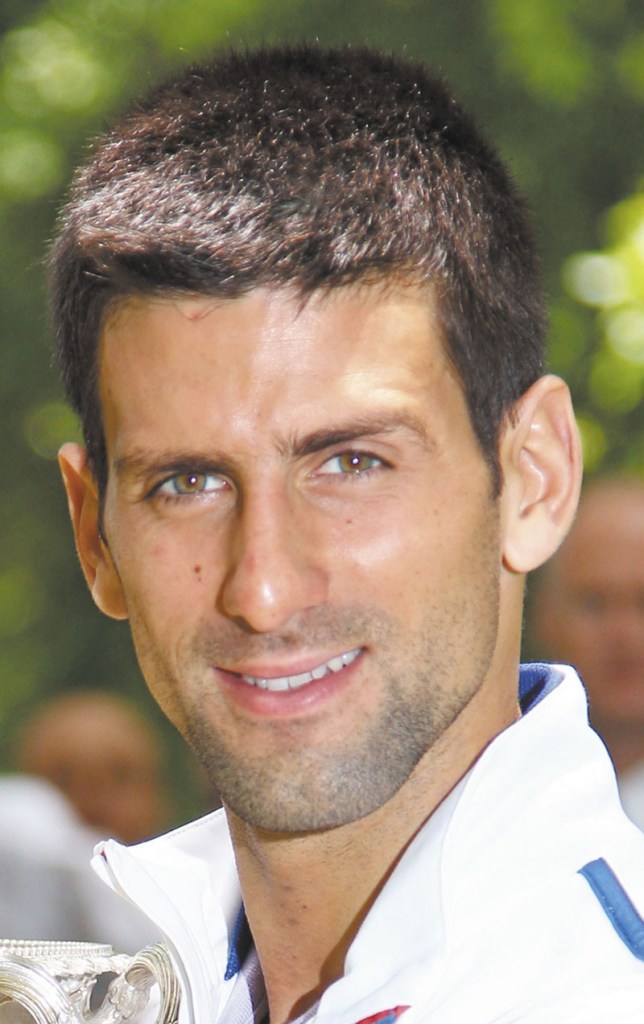PARIS — What a horrific dilemma this could be. The men’s 100-meter sprint final and men’s tennis final fall on the same day, Aug. 5, at the London Olympics. If forced, which would you miss: Usain Bolt possibly becoming the first man since Carl Lewis to win the 100 at consecutive games or Novak Djokovic perhaps putting a golden sheen on what promises to be another astounding year?
Until Sunday, Bolt would have been a comfortable winner.
But now? Impossible choice. And what a memorable day it could prove to be for those with time to rush from one event to the other or to tune into both.
Like Bolt, Djokovic is becoming one of those special athletes who transcends the confines of sport, a figure whose achievements on the field of play teach us not only new things about sporting endeavor but also about the bottomless well of human possibility.
Bolt’s 100, 200 and relay golds at the 2008 Beijing Games made the Jamaican more than just an Olympic champion sprinter but one of the greatest sportsmen of all time because he redefined our understanding of how fast humans can run.
Likewise, in outlasting Rafael Nadal for 5 hours and 53 minutes in the longest ever Grand Slam final, Djokovic played far more than a mere tennis match to win the Australian Open. He tested our definition of human endurance. How, just how, did he find those last drops of energy to first reel in and then finish off the Spaniard who, with a 4-2 lead in the fifth set, looked as though he might wriggle free?
It was the incredible will Djokovic demonstrated that made this feat immortal. Like Muhammad Ali flooring George Foreman with a left, then a right in the eighth round of the Rumble in the Jungle or Lance Armstrong picking himself up from a crash at the 2003 Tour de France and powering up a climb with cold-eyed fury on his broken bike, this was epic because it was as much about heart as it was about physical ability.
“You’re going through so much suffering; your toes are bleeding,” Djokovic said. “Everything is just outrageous, you know, but you’re still enjoying that pain.”
At the end, he ripped open his shirt with a primal scream. It wouldn’t have been that much of a shock if Djokovic had also ripped open his hairy chest to show us just how fiercely his ticker beats.
What a terrifying sight for Andy Murray and Roger Federer. The hypochondriac Djokovic who in years past looked unlikely to ever match Nadal’s physicality, the joker Djokovic who seemed unlikely to equal Federer’s cool professionalism, has been body-snatched and replaced by Superman on a gluten-free diet.
Murray, the world No. 4, came away from his five-set, 4 hour and 50-minute Australian semifinal loss to Djokovic feeling that he is edging closer to the No. 1. Maybe. But two days later, on Sunday, Djokovic and Nadal then shifted the benchmark yet further forward. The ferocity of their contest made the idea that Murray could beat first one of them and then the other in a Grand Slam semifinal and final look fanciful again.
Same goes for Federer, the No. 3. As long as Nadal and Djokovic are fit, it will only get more difficult for the 30-year-old to get his hands on a 17th Grand Slam title by toppling those men five and six years his junior.
For Nadal, Sunday’s final offered some evidence that the No. 2 no longer looks in trepidation across the net at Djokovic and that the deep hurt done to his confidence by losing six finals to the Serb last year might not be permanent. In becoming the first man to lose three consecutive Grand Slam finals, all to Djokovic, at least Nadal this time pushed his nemesis to five sets.
But as positive as Nadal sounded about this defeat — “I always said is good suffer, enjoy — enjoy suffering, no?” — will the scabs on his psyche simply flake right off the next time they meet?
One hopes not. Because, like the very best Hollywood blockbusters, this epic cried out for a sequel and left us hungry for more. Some, including 7-time major winner Mats Wilander, already are talking up the possibility of a calendar Grand Slam for Djokovic this year. That is premature, but won’t be if Djokovic wins the French Open — the only major he let slip away in 2011 — this June.
After that, Wimbledon’s Center Court will be calling, with the men’s final on July 8 and the Olympic final a month later. Just imagine if those produce a Djokovic-Nadal double-bill.
If that happens, then the Aug. 5 dilemma won’t seem so quite knotty anymore.
Anyone want tickets for Bolt?
John Leicester is an international sports columnist for The Associated Press. Write to him at jleicester(at)ap.org or follow him at twitter.com/johnleicester
Send questions/comments to the editors.



Success. Please wait for the page to reload. If the page does not reload within 5 seconds, please refresh the page.
Enter your email and password to access comments.
Hi, to comment on stories you must . This profile is in addition to your subscription and website login.
Already have a commenting profile? .
Invalid username/password.
Please check your email to confirm and complete your registration.
Only subscribers are eligible to post comments. Please subscribe or login first for digital access. Here’s why.
Use the form below to reset your password. When you've submitted your account email, we will send an email with a reset code.